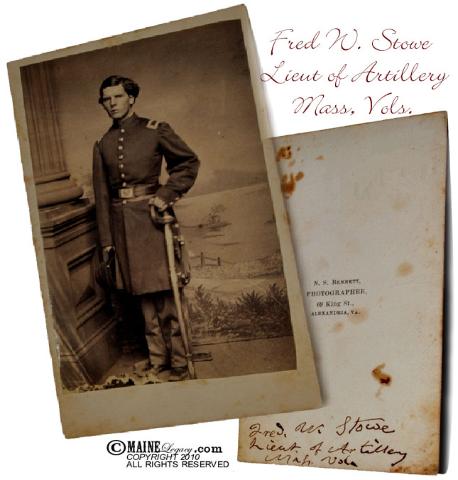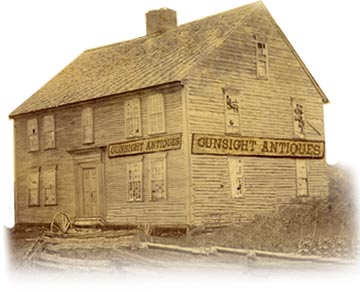
Frederick William Stowe
The story of
A PERSONAL TRAGEDY
A rare signed carte de viste of Harriet Beecher Stowe’s son Frederick William Stowe. The image was captured by a local Alexandria, Virginia photographer in 1862 when Stowe was serving as Lieutenant of Co. F 1st Mass. Heavy Artillery. Troubled by alcoholism since the age of sixteen, twenty-one year old Frederick Stowe left Harvard Medical School where he was a mediocre student and on May 23, 1861enlisted as a Sergeant. Co. A 1st Mass. Volunteer Infantry. Under the shadow of a celebrity mother always eager to interject on her troubled son’s behalf, Frederick’s military experience seemed always in a state of flux. Discharged from the 1st Mass. Infantry for promotion, Stowe was commissioned into the 1st Mass. Heavy Artillery in January 1862. Torn between a fear that military camp life close to Washington would lead her son into temptation beyond his ability to cope, Harriet would eventually acquiesce to Frederick’s desire for reassignment yet again . Accordingly in January of 1863 young Frederick resigned his commission with the 1st Mass. Heavy for commission to a position on the staff of his mother’s old friend, Brig. Gen. Adolph von Steinwehr. This would keep the troubled young officer away from the temptations of war time Washington City and a coveted spot on a Division Commander’s staff should narrow the potential of combat injury. Once again good fortune would pass the popular author’s son by when he received a head wound at the battle of Gettysburg. The long and painful rehabilitation would further exacerbate young Stowe’s ability to cope. Considering the liberal application of opiates for pain management in the time, one must wonder the full impact of the Gettysburg wound on this soldier’s ongoing fight with addiction? Frederick resigned his commission on August 1, 1864 only to enlist and muster in on October 14, 1864 as a Private in the 1st Connecticut Light Artillery. He was discharged on June 11, 1865 and received a Brevet to 2nd Lieutenant on June 12, 1865. Upon separation from the Army, Frederick moved back in with his parents. Despite enrollment in an extensive rehabilitation program, drinking continued to be the focus of his life, his emotional condition ever worsening until in 1871 he took sea passage around the Cape, bound for San Francisco. It seemed he had hit bottom. Upon arrival on the west coast, Frederick wrote his mother of hiring on from there, going to sea as a last ditch effort to overcome his addiction. Here Frederick William Stowe disappeared with no further evidence of his ultimate fate. Had he taken his own life as at least one of his letters would suggest? Did he fall upon some ruffian corruption in the rowdy San Francisco dock culture, or did he indeed go to sea, the circumstances of his demise to be swallowed by time? Continued investigative efforts on behalf of his mother were futile.








